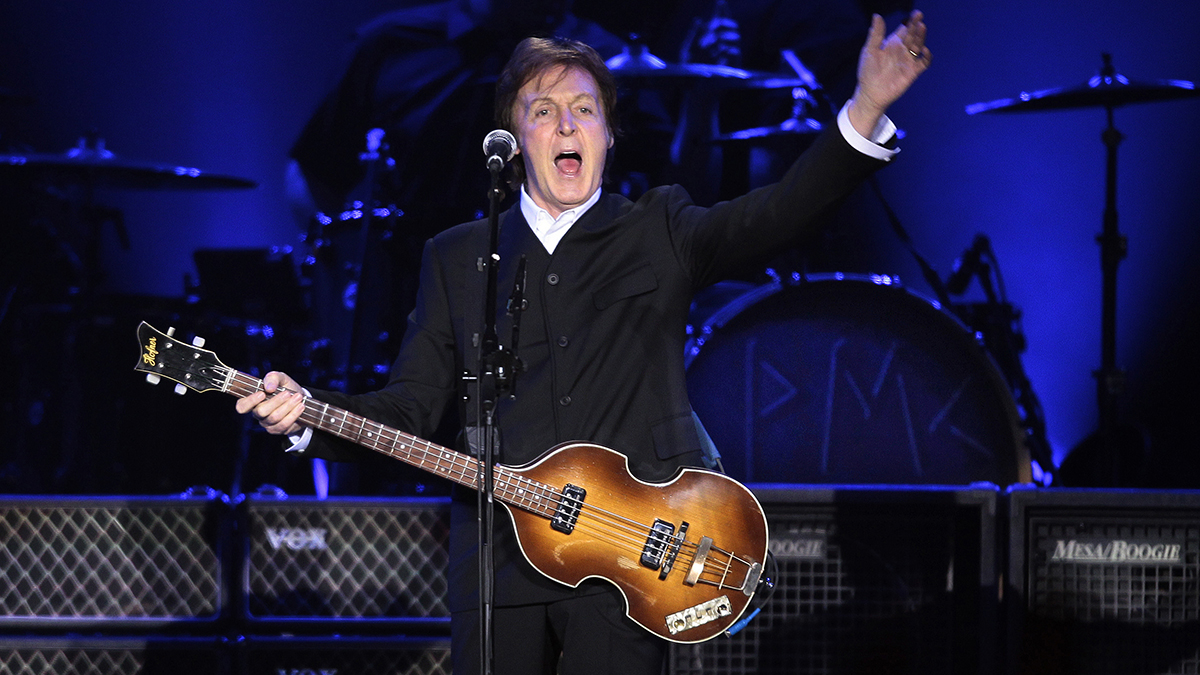Flea names the one bassline that he would “go back and fix” from the Red Hot Chili Pepper's 1995 album, One Hot Minute
Flea on the making of One Hot Minute: “I thought it sounded like another stupid white boy trying to be funky!”
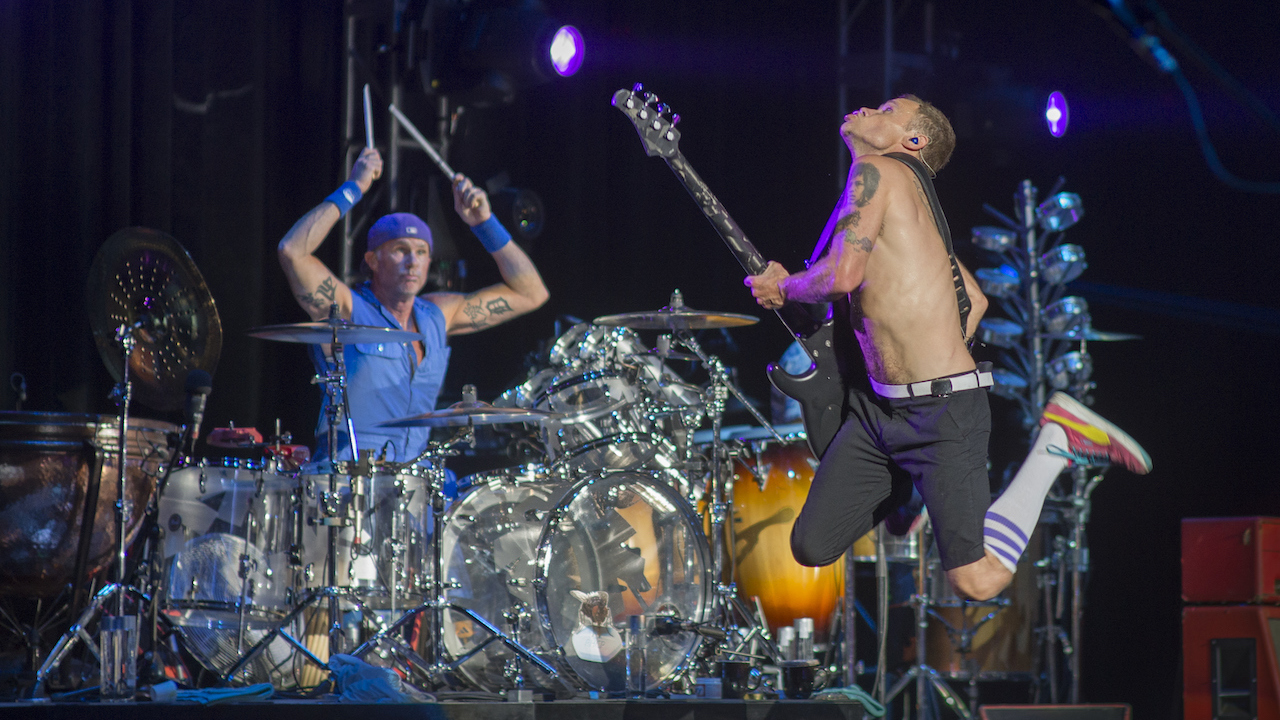
Whether One Hot Minute was a disappointment or a criminally overlooked album in the Red Hot Chili Pepper’s arsenal is up for debate. Many consider it to be one of their weaker efforts, but it certainly yielded some great songs. The addition of ex-Janes Addiction guitarist Dave Navarro brought a heavier slant to the group’s sound, with borderline metal moments on Warped and Coffee Shop.
"Actually, Aeroplane was the only song I was worried about,” said Flea in his 1996 Bass Player cover story. "I thought it sounded like another stupid white boy trying to be funky! When I played it live in the studio, the bass didn't record right, so it was one of the few things I had to overdub. I put it out anyway, but it's the one thing I'd go back and fix. The part kept feeling stiff to me, as if it wasn't my day. I wanted to redo it, but Rick Rubin said it was cool."
Don't let Flea's humbleness fool you. Aeroplane has to be one of the funkiest use of slapped octaves ever. The bassline in the verse isn’t as flashy as Flea’s earlier slap style, but his wiry tone and heavy thumb perfectly illustrates his commanding-yet-essential approach, while the fingerstyle line in the chorus, with its huge slides and groovy fills, weaves effortlessly in and out of the vocal melody. And there’s an awesome bass solo to boot. Weak effort? We think not.
The following interview is from the February 1996 issue of Bass Player. During a two-week break from the Chili Pepper's gruelling tour schedule, Flea took some time to explain why he's fallen back in love with his instrument, how not to be a player who's "all flash and no smash," and how practicing Transcendental Meditation helped him to become a better musician.
There are a bunch of different styles mixed together in the bassline of Aeroplane. How did you come up with the slap part in the verses?
"I was sitting in my garage with a bass guitar Louis Johnson gave me – a Treker Louis Johnson Signature 4-string – and I started playing that '70s funk line. The bass had light strings on it and had that whacka-whackita sound. It's kind of a ‘been done’ groove, but it's nice and Anthony liked it. The chorus part was one of those things where we were stuck; sometimes when we're looking for another part, I'll have no idea what I'm going to do, but I'll say, 'What about this?'"
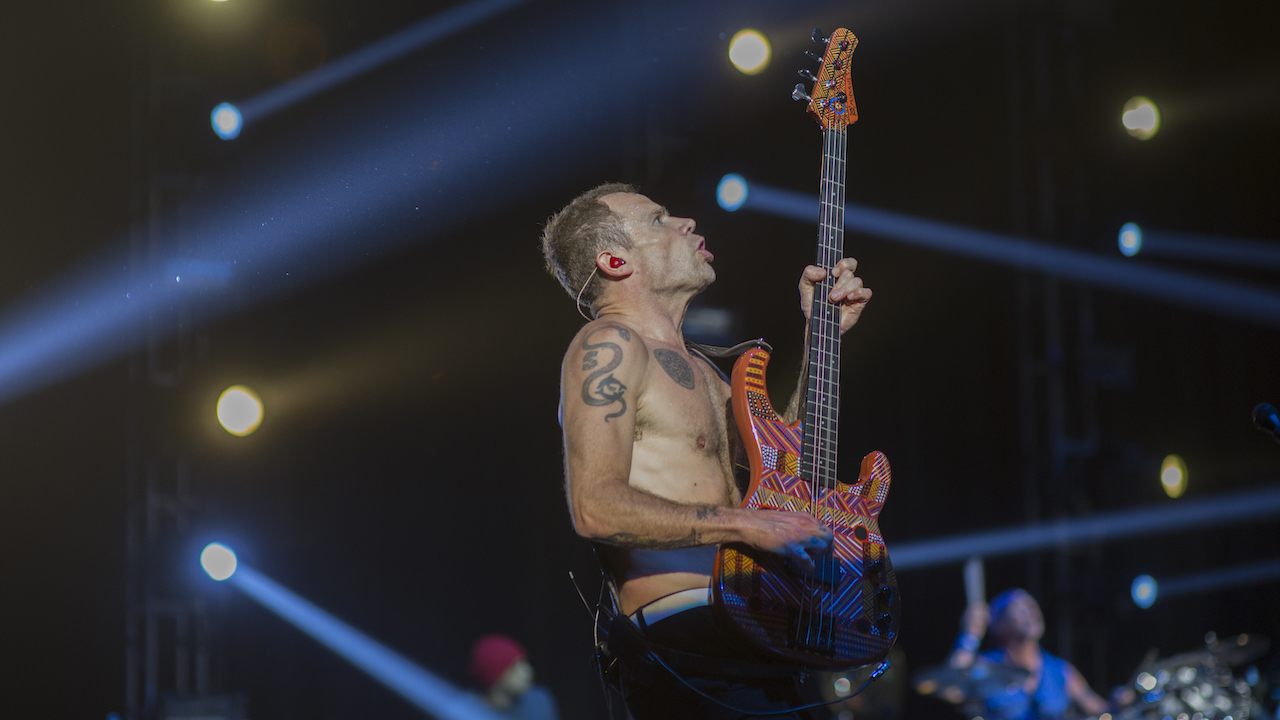
Compared to the full-bore thumbwork of early Chili Peppers records, your parts on Blood Sugar Sex Magik showcased a more stripped-down approach. On One Hot Minute, did you try to combine elements of both?
"I was trying to play simply on Blood Sugar because I had been playing too much prior to that, so I thought, I've really got to chill out and play half as many notes. I think my playing on One Hot Minute is even more simple; I thrashed through the recording and didn't care about the parts being perfect. It's not that I don't love the bass passionately anymore – I just felt I'd been getting too many accolades for being Joe Bass Player."
Some might argue that this record is one of your stronger bass efforts.
"Really? Maybe not thinking about it made me play better. I definitely left lots of mistakes on there, and I can't even think of anything I played that was complex; even the slapping stuff is simple. It's original-sounding, and I'm proud of that, but what I played was more a matter of aesthetic choice. On the other hand, I guess Giant Steps was simple to John Coltrane, because it was him playing it. It's easy if you can do it!"
Coffee Shop is chock full of bass stuff, including a solo.
"It's funny – Coffee Shop would never have been a song if it weren't for this effect called the Electro-Harmonix BassBalls. I started playing with it one morning in Hawaii, and it had the most amazing underwater, Bootsy kind of sound – and it also had this siren effect going on. But when we got to L.A. to start recording, the box never made the sound again. I got so mad, I crushed it! I almost didn't even want to record the song, because to me, it was all about that bass sound. I ended up using a Boss Dynamic Filter on the record."
In the solo, it sounds as if you're ripping the strings off the fingerboard.
"We didn't know what to do at the end, so I said, 'I'll solo.' I played the track once, and I wanted to fix it later because I thought it sucked, but I never did."
All the latest guitar news, interviews, lessons, reviews, deals and more, direct to your inbox!
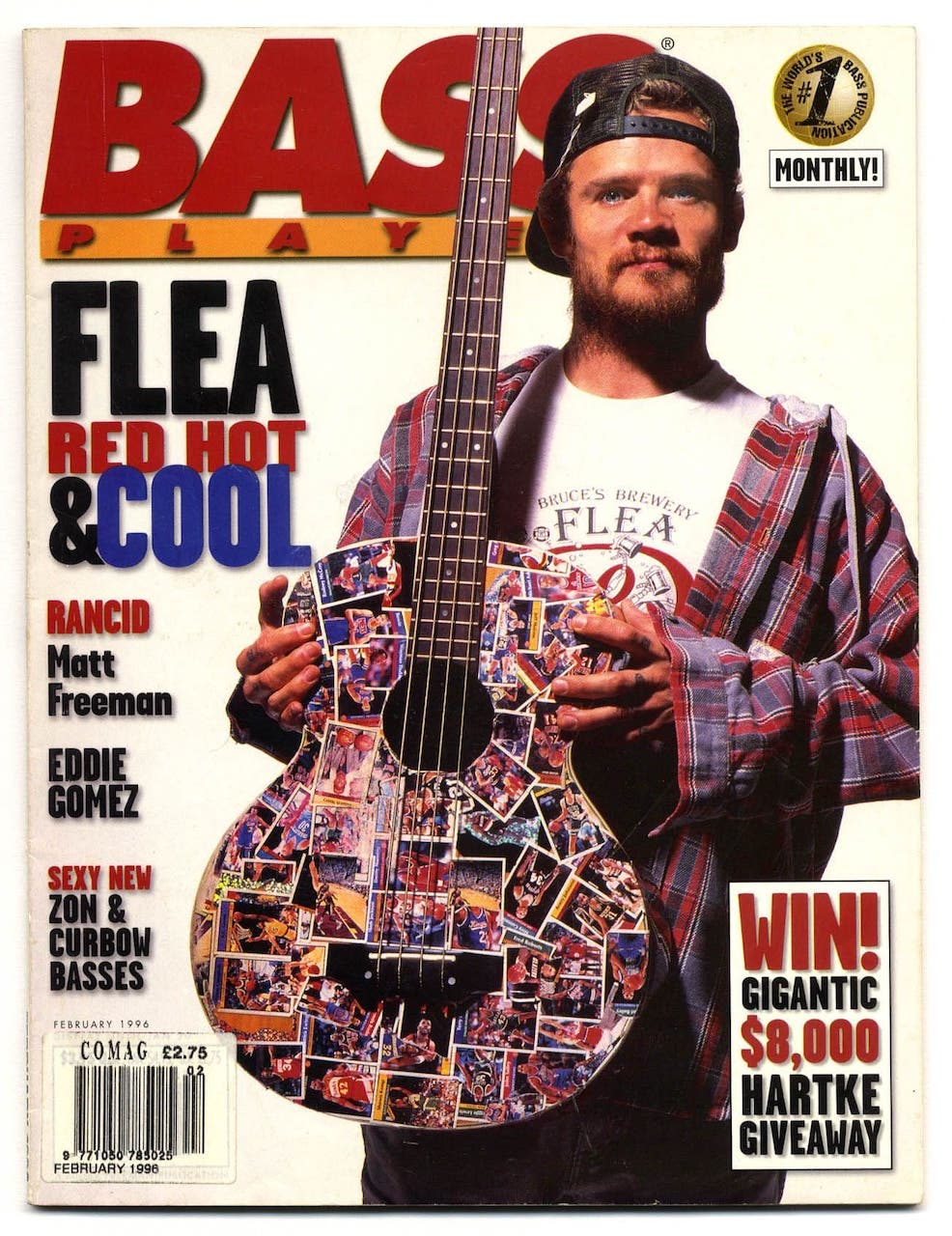
Pea, your bass-and-vocals solo piece, features an acoustic bass guitar.
"Yeah – it's a Sigma acoustic bass guitar. There's not much to say about Pea. I mean, it's just a song I wrote."
Are you catching any flack for it?
"Because I say, 'Homophobic redneck dick'? I did get some shit for it, but fuck those people! We had to put out a version of the album for Wal-Mart without that song."
Did that upset you at all?
"No. If someone says, 'I'm not going to buy your record, but I'll buy these songs,' then okay – buy those songs. I'd rather they hear it all, but to hell with my ego."
The ending of One Big Mob has a heavy feel.
"That song was actually part of a 12-minute movement. The end was the intro to another song called Stretch You Out, which is more of a funk thing, but we didn't put it on the record. It's too bad, because bass players would probably like that tune more than any other song on the album. I think we'll put it out as a B-side."
Walkabout is built around the bass, especially the verses.
"I had gone to see the Spike Lee movie Crooklyn, which has this cool '70s funk soundtrack. I came home, picked up my bass, and started playing that verse line. I wrote the intro at rehearsal – it was another of those 'What about this?' things."
Transcending centres around a twisted b7 bass riff.
"I play the root and the b7, which ring at the same time, and then I play the 4th and bend it up while I keep plucking. I wrote that part on my acoustic bass guitar while I was sitting on the beach in Hawaii."
How did you get that ultra-slimy sound on Falling Into Grace?
"It's the BassBalls, the Boss Dynamic Filter, and maybe a Boss Auto Wah, too. I had all three hooked up, but I may have used only two of them."
How do you think One Hot Minute differs from Blood Sugar Sex Magik?
"There are two big differences. First, I was in a different place emotionally for this record. I was coming out of a two-year period of misery, when I was down emotionally, physically, and spiritually. Second, Dave Navarro is intensely different from John Frusciante. Dave is really into the studio; he would spend weeks on every song, put something like 15 tracks of guitar on every tune, and weed through it in the mix. Dave's sound is more layered and 'effecty' than John's, which was like, boom – play it dry and leave it alone."
So the contrast between your styles created the album's textured sound?
"The contrast made a big difference. John was a huge fan of the band when he joined, so it wasn't a big change for us. He did come into his own aesthetic as time went on, and he had a huge amount to do with the sound of the band, but Dave's coming from his own trip – the Jane's Addiction thing in particular, which was very different from the Chili Peppers."
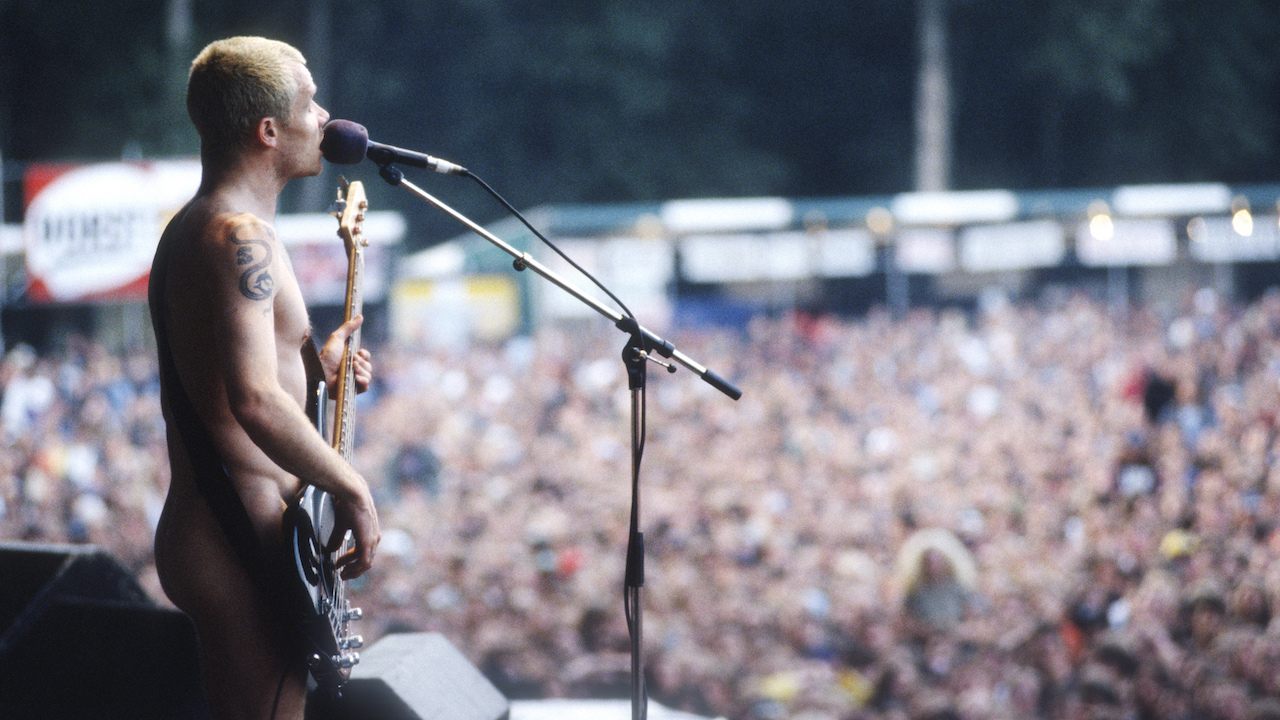
Did adjusting to yet another guitar player affect the feel?
"We were playing something new, and it was exciting – but on the negative side, we'd never toured together. The record is what it is, though: a document of that time. It has good energy, the grooves are good, and the music is good. I'm happy with the way I played, but I'm already onto another groove."
The band's jams seem to be stretching out into new areas.
"To me, this is the least jam-oriented record we've made. I mean, we definitely jammed on the ideas, but there's only one groove on the whole album that came from a jam, Deep Kick. The rest of it came from sitting down with a guitar or bass and saying, 'Check this out, guys.' I wrote almost all of the music on the record."
So you've expanded beyond writing only grooves?
"I've always had a major hand in writing, but on some of the One Hot Minute songs, I wrote the chords and the melody and most of the words. I wrote a lot of the lyrics on Deep Kick and Transcending, for example."
Did you put the songs together on a 4-track?
"I've got one, but mostly I'd play acoustic guitar and come up with the chords and melody, and Dave would take my simple guitar part and play it in his magical Navarro way. Or, I would have a bassline, and Dave would think of a guitar part to go with it."
When did you start learning to play guitar?
"I started a couple of months before we began making this record. Rick Rubin gave me a Martin acoustic, and I bought a Neil Young songbook to learn chords. Playing guitar has definitely helped me as a songwriter; instead of thinking in terms of basslines and grooves, which is an amazing way to think, I now think about chord progressions and melodies. It's another musical dimension for me."
One Hot Minute is available to buy or stream
- Nick WellsWriter, Bass Player
